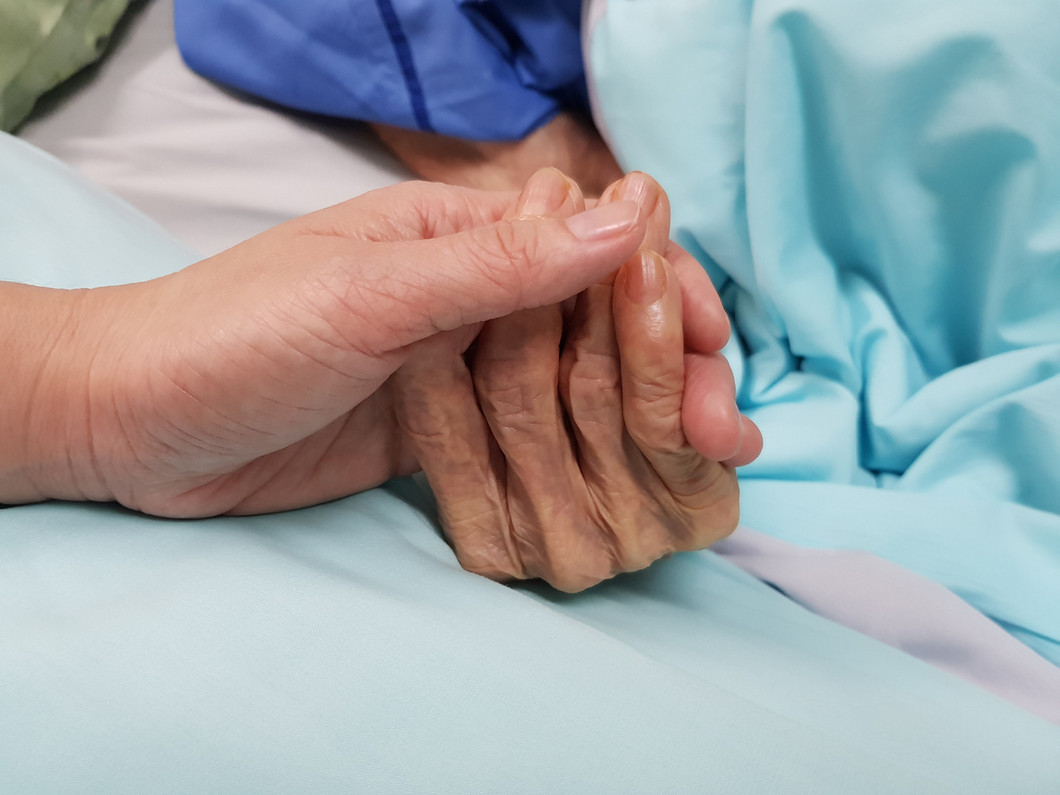Dying Brave: A Journey to Healing
By Hilda Villaverde
I met Joe when I was thirty-five and he was forty-two. We married seven years later and divorced after ten years of marriage. Our friendship of forty years never ended until his passing a few weeks ago. Ours was a unique relationship of healing until the end.
Joe was a quiet private man. An only child, born in Kentucky and raised by his German grandmother while his father served in World War II and mother worked for the Red Coss, he earned degrees in engineering and became an Air Force officer. A Southern gentleman, curious by nature, a voracious reader, extremely organized, and rigid in his beliefs, Joe was a man of few words. He busied himself with objects and projects, not people and sentiments. A man of reliability, Joe did what he said he would do and did it well.
I am a Latina woman. Nothing escapes my line of vision, and I feel the need to comment on everything I see and feel. My emotions run elevated, and my amplification of details is simply part of living life and telling a good story. Structured yet creative, a business owner in the beauty industry satisfies my energetic and probing personality.
When Joe and I married, I needed a stable man who could provide safety and dependability during one of my bouts with anxiety and panic disorder. A time when Joe’s solidness drew me in for well-needed healing. I clung to his calm temperament until I recovered. After ten years, feeling restored to take on the world again and wanting more than security, I left our marriage. Only by the grace of God did we remain dear friends.
During the following twenty-three years after our divorce, Joe and I saw each other for holidays and during visits with my son and mom when they came to visit. Mom and Joe shared a passion for jigsaw puzzles, authentic Mexican food—which she cooked for him—and a strong mutual respect. They truly enjoyed each other’s company.
Joe was the father my son longed for as a child and didn’t have with his own dad. Patient and knowledgeable, Joe discussed cars, the state of the world, firearms, and politics. They became best friends.
Joe did not have children of his own. Retired, he also insisted on helping me with errands and repairs at my home and business. Our life together was friendly and helpful.
Three years ago, Joe was diagnosed with pancreatic cancer. I promised my support during the process and treatments. Chemotherapy, radiation, several procedures, and numerous endoscopies put Joe into a constant battle to regain his health. In his eighties, he remained hopeful and vigilant, and I stayed by his side.
He and I became closer and developed a partnership we didn’t experience during our marriage. On Sundays, we took field trips, driving to different areas of our city. We walked downtown, exploring our city like tourists. We held hands when we walked, something Joe avoided during our marriage. For him, any display of physical contact in public was inappropriate. But he needed my hand to steady him as he walked. We were gentle with each other.
Indoors, we built LEGO Technic models, and it became an obsession with us. As I write, I am looking at a meticulous list he kept of the LEGO sets we assembled, including model numbers, number of pieces, and the date of completion. It was a daunting process for us to assemble the models, with Joe’s hand tremors and my impatient high energy. But, with each model, we grew closer and found one more reason to keep going. We spent hours constructing a Jeep Wrangler, a Range Rover, an airbus helicopter, and a Star Wars R2-D2, to name a few. Patience with each other grew as we plowed through the manuals and learned to put together thousands of LEGO pieces—just as the scattered emotional fragments from our former marriage came together and healed as well.
All the while, I knew my time with him was limited. I felt the difference in his temperament as he became dependent on me and more pliable in our relationship. Our conversations became meaningful, and I heard his childhood stories for the first time. Joe allowed my hugs and didn’t pull away as he had previously. When he needed a back rub or help with dressing, he asked and welcomed my touch.
On Thanksgiving, six months before his passing, as I prepared dinner, I watched Joe sitting outside on the patio with my son, his wife, and the grandchildren, six and four. I knew it would be the last time we would celebrate a holiday as a family. My heart ached for more years with him. He was dying and I was repairing a resentment I harbored from our marriage. I had blamed him for being detached and rigid, and I had pulled away. That Thanksgiving Day, I could see he hadn’t changed. He remained the same man I had married, a man of few words, busy with objects and projects, and reliable, providing a safety net of dependability. He was still the same Joe, but my expectations for our relationship had changed. Simply, I had wanted more.
Two and a half years after the diagnosis and well into his treatments, painful and debilitating, Joe knew his health would not recover. After much discussion between the two of us, we agreed on hospice care for his remaining time.
Although I continued working full days, I spent the rest of my time with him and lost myself in his care at his home. We struggled with some aspects of his care, fatigue and edema, and laughed with each other while bathing him or pulling up his compression stockings. This new Joe took my hands, kissed them, and tenderly told me how much he appreciated me. He said he loved me, a proclamation I waited forty years to hear from this man of few words.
In his care, we forged a relationship of courage and forgiveness for the hurt we both felt during our divorce. We became united toward a single goal, a peaceful and quiet ending for him.
At eighty-three, Joe died a brave man with his mind unbroken, sharp and aware of his circumstances, and his dignity intact from years of self-realization. In a beautiful hospice care center, he slipped into his eternal sleep.
I am left with memories of our unique relationship. Most memorable are the past three years. We saw each other, stood together, and felt an unconditional love for life and the gift of caring for another.
I shall forever cherish his influence on my life. Few words are needed… the language of love involves simply being fully present.
As for the grieving that came upon me, it took me by surprise. Of course, I expected to miss Joe greatly. We had known each other forty years and in the previous three years my life revolved around him. But the overwhelming feelings of anxiety and despair were unexpected. I felt as if I was a partial shadow of myself and would never return to my normal self. Nor could I remember what I felt like without grief. Day after day, I struggled to find my footing back to my life without him.
In an article, “A Letter ‘To Every Grieving Heart’” by Gerald G. Jampolsky, he writes, “Some things don’t knock. They enter, shift the air, and alter the shape in ways we can’t describe but feel everywhere. Grief is like that.”
In the weeks that followed, with the help of friends and family, books and articles, and a good counselor, the air around me began to shift again and I began to feel like my normal self.
Most helpful was the story I told myself about Joe and our time together.
Yes, the story that told how he had been my rock for forty years was true. Even while divorced, I called on him for support, and he was always there to listen and quietly get things done.
The new story that he was gone forever, and I would continue my journey of healing without him, began to take root in my thoughts and feelings. I could create a new story going forward. One with the memories of a brave man who lived life his way.
I came to see grief as a wound that needed healing. There are thousands of books, support groups, workshops, and counselors specializing in the recovery of reclaiming ourselves after a loss. Perhaps most important is our attitude toward the relationships we garner during our lifetime, including the one with ourselves. Knowing there will always be loss in our lives, we can begin by knowing and trusting ourselves and cultivating sincere connections with our family and friends. There is nothing more powerful than the authentic love for oneself and the support of others who honestly care for us.
Commencement to living and dying a brave life is knowing who we are, our values, beliefs, strengths and weaknesses, and preferences. The embodiment of this knowledge can allow our emotions and stories to shift for us again in ways we do not expect, making us stronger and more compassionate. This then can provide a greater acceptance of life’s ever evolving cycle of beginnings and endings… and beginnings.
About the Author
Hilda Villaverde is a business owner and author of ten published books. Her career in the beauty industry as a hairstylist and salon owner spans five decades. Hilda is an ordained minister and at the age of fifty-five earned her doctorate in religious studies with a minor in pastoral counseling from Emerson Institute. Hilda considers herself an iconic influencer through her network of active, productive and brave women.




